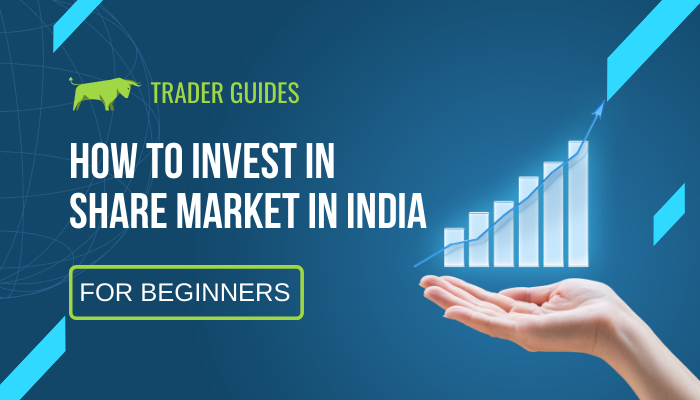In this post, you will learn about how to invest in shares in India. I have written this article for absolute beginners who want to start buying and selling shares but don’t know where to start.
Look no further. I believe after reading this post you will be able to start trading (buying and selling shares) profitably and make some extra money for yourself.
To start investing directly in the markets, you will need 3 different accounts – a Trading Account, a Demat Account, and a Bank Account. In this post, I have explained what are these accounts, what documentation is required to open these accounts, and where can you open them.
Let me take you through the complete process. It is quite simple and completely online.
5 Simple Steps to Start Investing Money In Stocks
Make Sure That You Have Surplus Money
Investing or trading should never be done with the money that can be utilized elsewhere.
You should make sure that you have a steady flow of income from other source(s) that can take care of your living expenses, all your debts are paid off so that you are not losing money on interest payments, and you do not require any additional funds in immediate future, and you have saved some extra cash for emergencies.
STOP! If any of the above is true then you should stop reading this immediately and take care of your funds before contemplating about the share market. You should only invest surplus funds that won’t affect your day-to-day needs.
I found a useful article that can help you in reducing your debt.
Collect Documentation
I am assuming that you already have a savings bank account. Nowadays it is extremely rare not to have a savings bank account in India but if you don’t have one then you should read the above point and get your funds in order.
You would need the following documents to open trading and Demat accounts.
Proof Of Identity
You would need to produce the original PAN card during account opening. PAN card is mandatory for trading account opening.
Proof Of Address
You can use any of the government-mandated address proof including Aadhaar card, Voter ID card, utility bills, rent agreement, and Passport.
Proof Of Bank Account
A canceled cheque is required to link your trading account to your savings bank account.
Proof Of Income
This is required only if you want to trade in derivatives (future and options). You can give your acknowledgment of your Income Tax Return (ITR) or Form 16 or 6 months’ bank account statement as proof of income. However, I would advise against trading in derivatives for beginners.
Passport-sized Photographs
Generally, 3 photographers are needed.
Power Of Attorney (POA)
It is required by your broker to place orders on your behalf. Buying & Selling are done in the broker’s name and later proceeds are transferred to your accounts. However, it is not mandatory. As an investor, you have a choice to issue or not to issue a PoA.
Find A Broker
Trading of stocks happens in a stock exchange where all the securities are listed. Most of the trading in India happens on the Bombay Stock Exchange (BSE) and the National Stock Exchange (NSE). But you can’t trade directly on the stock exchange. You have to trade through a broker registered with the Securities & Exchange Board of India (SEBI). The broker or a brokerage firm is an intermediary between a Stock Exchange and you.
https://www.sebi.gov.in/sebiweb/other/OtherAction.do?doRecognisedFpi=yes&intmId=30
In the earlier years, before the advent of the Internet, all the brokers used to provide offline services. Today also you will find some brokers providing offline services. These are quite cumbersome and time-consuming. So in this article, I have talked only about online broking.
For more details on choosing the right broker for yourself, refer to the next section.
Open Accounts
As discussed before, you will need 3 different types of accounts. These are:
Savings Bank Account
Generally, everyone has a savings account. But you may or may not want to use your existing account for trading activities. If you want to use your existing account then it will be linked to your trading account. Otherwise, you can open a new account.
Trading Account
This account is used for placing orders in the stock exchange. It is linked to the bank account. Each time you buy shares, cash is debited from your bank account whereas each time you sell shares, cash is credited to your bank account.
Demat Account
In this account, shares are held in a dematerialized form (electronic form instead of physical certificates). It is quite similar to a savings bank account but instead of cash entries, you will see your security holdings in this account. Each time you sell shares they are debited whereas each time you buy shares they are credited to your Demat account.
Start Making Money
This is the final step. Now you can start using trading account application(s) to put buy and sell orders. This is where you start making money. However, you should be careful. Otherwise, things may go south and you start losing money.
Now, the big question is which stocks should you choose? I have given a few pointers in the next section.
Two Types of Brokers
Full-Service Brokers Or Traditional Brokers
As the name suggests, these brokers provide a full range of services related to different types of securities. They not only provide stock broking services but also all kinds of research, advisory, trading, and, investment services related to stocks, derivatives, commodities, bonds, debt instruments, mutual funds, insurance, IPOs, and other exchange-traded securities.
Most of the scheduled commercial banks provide full-service broking. They also offer a 3-in-1 accounts wherein savings, trading, and Demat accounts are held with the same bank. These accounts have their own advantage. You don’t need to go to different firms to open different accounts.
On the flip side, the broking charges and commissions are generally higher than discount brokers.
Discount Brokers Or Budget Brokers
Discount brokers just provide the sock and derivatives trading services. They do not offer research or advisory services. Some of them also offer trading facilities for commodities and currency.
Generally, their broking charges and commissions are on the lower side.
If you are looking for convenience and a full range of services, you can opt for a full-service broker. But, if you want to trade heavily and save on commissions then you should go for a discount broker.
How Can You Instantly Start Making Money From Trading?
Conclusion
I have described a 5 step process to start investing/trading activity. Although the article is a bit long but the process is quite simple. You just need to call your chosen broker and they will do all the paperwork for you.
Over To You
Do you think you will be able to start a profitable trading activity after reading this blog post? What other information would help you? Please leave a comment.
Have a profitable life ahead!
(The names given here are just given as examples of well-known companies offering online broker services, they are neither recommendations nor a testimonial to their performance, and please do research before selecting your broking firm.)




